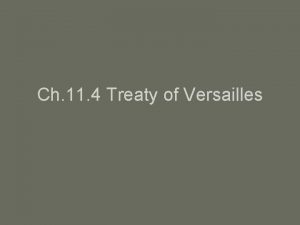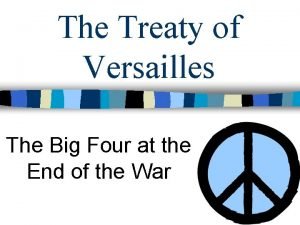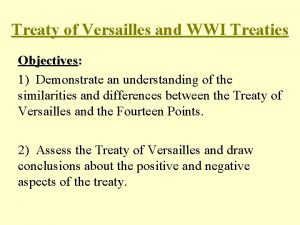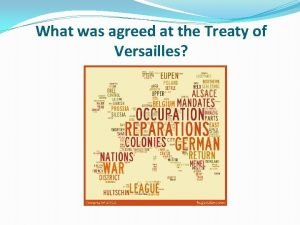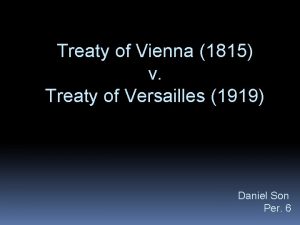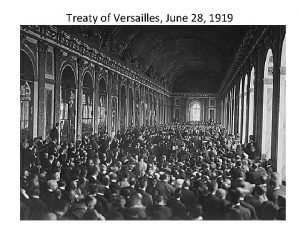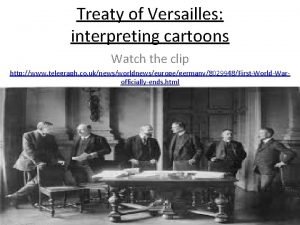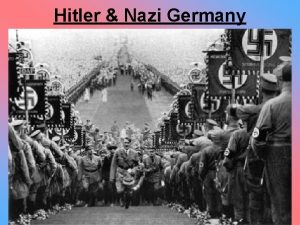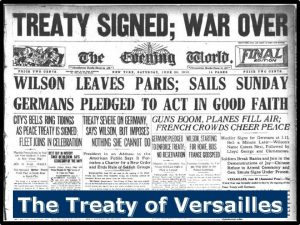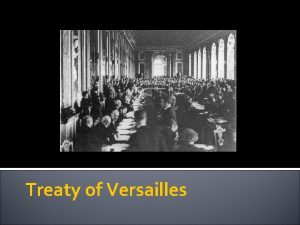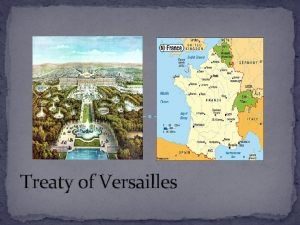Hitler and Nazi Germany The Treaty of Versailles

















- Slides: 17

Hitler and Nazi Germany The Treaty of Versailles

The Treaty of Versailles In today’s class, I am learning to: • Describe the conditions included in the Treaty of Versailles • Explain why Germans were opposed to the Treaty

The Treaty of Versailles Germany’s November 1918 surrender was only a temporary agreement – a more formal deal was needed to officially end the war.

The Treaty of Versailles In January 1919, the winning sides began a Peace Conference in Paris. This involved the sides meeting to discuss what punishments they intended to inflict on Germany was not a part of these discussions.

The Treaty of Versailles A final deal was agreed by June 1919. This agreement – signed at Versailles Palace in Paris – became known as the Treaty of Versailles. Germany was forced to sign the deal – or face the prospect of the war being restarted.

The Treaty of Versailles The final treaty included 440 articles, outlining various punishments for Germany. These covered: • • Germany’s military German territory/land Blame for the war The costs of war

The Treaty of Versailles German military • Germany’s army was limited to only 100, 000 soldiers • Army conscription was banned in Germany • Germany was not allowed submarines or an air force • Size of navy was limited

The Treaty of Versailles German territory • The Alsace-Lorraine area was given to France • Germany was divided to create the Polish Corridor • The Sudetenland was given to Czechoslovakia • Germany also lost all of their overseas territories

The Treaty of Versailles Blame for the war One of the most controversial sections of the Treaty was Article 231. The so-called ‘War guilt clause’ forced to officially accept the blame for starting the war, and any subsequent problems it caused.

The Treaty of Versailles Costs of war As Germany was forced to accept blame for starting the war, it had to pay the full costs of war. This involved paying reparations to the winning countries – a figure that was initially set at 132 billion gold marks.

The Treaty of Versailles Germans were outraged at the conditions of the Treaty and called it a ‘diktat’, meaning they were being forced to accept it. They were angry for different reasons, including military concerns, the loss of land also the costs of defeat.

The Treaty of Versailles General concerns Germans were angry because they had been forced to accept the Treaty, without any chance to negotiate. Many Germans felt they were being unfairly punished for the actions of their leaders.

The Treaty of Versailles Military worries Many Germans were worried that their weakened military left them open to attack from countries such as France or Russia. They also felt humiliated by being forced to accept a smaller military.

The Treaty of Versailles Blame for war Most Germans did not believe that their country was solely responsible for the war taking place. They were therefore very angry at the idea they should accept official responsibility for this.

The Treaty of Versailles Territory Germans were angry that land they believed was rightly German had been taken. The loss of land made it harder to rebuild their economy. Germans living in these areas were also furious and confused at being forced to accept a change of country.

The Treaty of Versailles War costs Germans did not want to have to pay the full costs of the war, especially if they believed the war was not their fault. This was made worse by ongoing poverty problems in Germany, who had to pay their own war costs.

The Treaty of Versailles As a result of signing the Treaty, the new German government became very unpopular with many Germans. They complained about the November Criminals, who had “stabbed them in the back”. Hitler would later exploit these views.
 Lesson 3 hitler and nazi germany
Lesson 3 hitler and nazi germany How did the treaty of versailles affect postwar germany
How did the treaty of versailles affect postwar germany Nazi germany
Nazi germany Schutzstaffel
Schutzstaffel What is this image
What is this image Germany map
Germany map Whats the truman doctrine
Whats the truman doctrine Comparing the 14 points & treaty of versailles
Comparing the 14 points & treaty of versailles Wilson's fourteen points and the treaty of versailles
Wilson's fourteen points and the treaty of versailles The big 4 and the treaty of versailles interactive notebook
The big 4 and the treaty of versailles interactive notebook Us and the treaty of versailles
Us and the treaty of versailles The big 4 treaty of versailles
The big 4 treaty of versailles Fourteen points and treaty of versailles similarities
Fourteen points and treaty of versailles similarities The big three treaty of versailles
The big three treaty of versailles Treaty of vienna 1815
Treaty of vienna 1815 Article 231 of the treaty of versailles
Article 231 of the treaty of versailles Peace and future cannon fodder analysis
Peace and future cannon fodder analysis Pptpalooza
Pptpalooza








